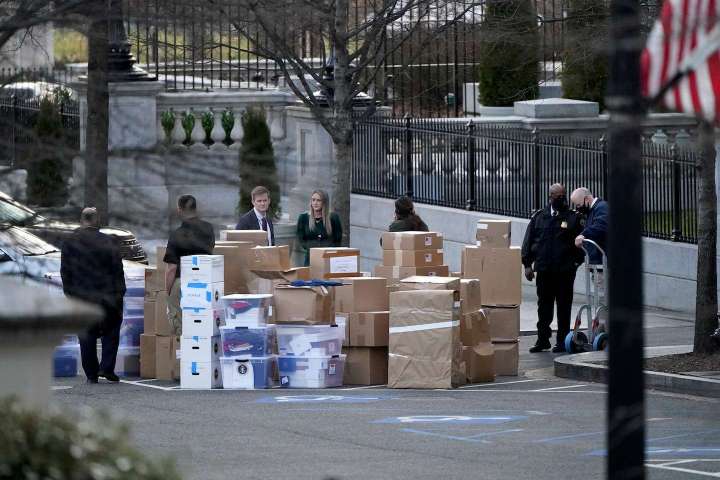It’s a question that has lingered since the historic search of Donald Trump’s residence at Mar-a-Lago two months ago: Is it possible he still hasn’t returned all of the government documents, even after the search?
Did Trump not return all documents? Here are the reasons that’s plausible.

As the story acknowledges, it’s not like this concern came out of nowhere. There has been myriad evidence not only that Trump sought to obscure the documents for more than a year, but that the Justice Department suspected that there might be more even shortly after the search.
It’s worth consulting the excellent timeline my colleague Rosalind S. Helderman has constructed.
The first thing to note is that Trump has clearly resisted turning over all the documents. The back-and-forth with the National Archives dates back to spring of last year, and Trump spent the next several months resisting its demands. Trump then turned over 15 boxes in January, and he handed over another set in June after a subpoena. The August search of Mar-a-Lago allowed agents to review the documents Trump had, but only in parts of the property the search warrant allowed them to venture.
The second is that, through it all, there’s plenty of evidence that Trump and his advisers have falsely claimed — and that Trump himself sought to have his lawyers falsely claim — that all such documents had been turned over:
- The most prominent example is a sworn statement signed by Trump lawyer Christina Bobb in June, when Trump’s legal team handed over some documents. It said that a “diligent search was conducted” and that “any and all responsive documents accompany this certification.”
- The Washington Post’s Jacqueline Alemany and Josh Dawsey also reported this week that Trump in early 2022 asked his lawyer Alex Cannon to tell the Archives that all materials sought by the agency had been returned. But Cannon refused. Trump later released a public statement that didn’t include the assertion that everything had been returned.
- Alemany, Dawsey and Helderman reported last month that former Trump deputy White House counsel Pat Philbin had provided a similar assurance to the Archives as far back as September 2021. Philbin said that former Trump chief of staff Mark Meadows had told him none of the material Trump took was sensitive or classified, and that Trump only had 12 boxes of news clippings.
Philbin’s language — i.e. citing Meadows — and Cannon’s refusal both point to the prospect that Trump’s own lawyers don’t fully trust the people they are dealing with. And part of that could be that Trump hasn’t been terribly forthcoming. For example, The Post reported in recent weeks that, when some documents were turned over in January, Trump personally oversaw the packing of the boxes himself “and did so with great secrecy, declining to show some items even to top aides.”
Thirdly is something else that the Times reported in its story Thursday night: that one of Trump’s more recently installed lawyers, Christopher Kise, advised him to hire a forensics team to conduct a voluntary search for any additional documents. Trump was reportedly initially onboard at first, but was later talked out of it.
A fourth is that Trump’s document-retention habits were notoriously bad, including ripping up documents and reportedly putting them in the toilet — and that haphazard treatment extended, The Post reported this week, to classified documents. We already know the classified records found at Mar-a-Lago were mixed together with all kinds of other documents. And even if you don’t believe Trump deliberately continues to retain additional documents from the White House, there’s the prospect that some might have been destroyed or lost.
The final key point is that the Justice Department has been pointing in this direction for a while.
Questions about potential other documents first cropped up in earnest after a district court unsealed an inventory list of documents seized in the August search. The most conspicuous inclusion: the presence of 48 folders that were described as “empty folders with ‘CLASSIFIED’ banners.”
While it wasn’t clear whether those folders had contained documents seized in the search or handed over elsewhere, it raised the prospect of whether the documents could be traced to specific folders and help determine if everything had been handed over. (Archives officials had previously described “unfoldered” classified documents as being among things that were “of most significant concern.”)
Shortly thereafter, the Justice Department made clear the prospect of unreturned documents was a priority. A week after the inventory list was released, the Justice Department said in a court filing that it needed access to the seized materials to determine whether materials stored in the folders “may have been lost or compromised.” It also cited “efforts to identify the existence of any additional classified records that are not being properly stored.”
In another filing to an appeals court, it reiterated the need for the documents, saying reviewing them “could lead to identification of other records still missing.”
That could’ve been interpreted as a ploy to get access to the documents, by floating a worst-case scenario and daring judges to deprive them of the records needed to investigate. But the Justice Department reportedly raising the issue with Trump’s own lawyers — and stating it so directly as that it believed Trump hadn’t returned everything — takes things to another level.
And one that wouldn’t seem like a huge stretch, if past is precedent.






